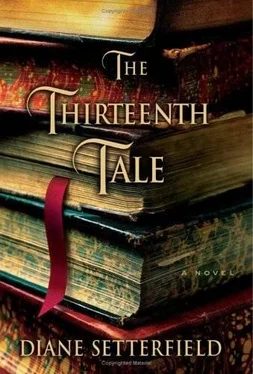Diane Setterfield - The Thirteenth Tale
Здесь есть возможность читать онлайн «Diane Setterfield - The Thirteenth Tale» весь текст электронной книги совершенно бесплатно (целиком полную версию без сокращений). В некоторых случаях можно слушать аудио, скачать через торрент в формате fb2 и присутствует краткое содержание. Жанр: Современная проза, на английском языке. Описание произведения, (предисловие) а так же отзывы посетителей доступны на портале библиотеки ЛибКат.
- Название:The Thirteenth Tale
- Автор:
- Жанр:
- Год:неизвестен
- ISBN:нет данных
- Рейтинг книги:4.5 / 5. Голосов: 2
-
Избранное:Добавить в избранное
- Отзывы:
-
Ваша оценка:
- 100
- 1
- 2
- 3
- 4
- 5
The Thirteenth Tale: краткое содержание, описание и аннотация
Предлагаем к чтению аннотацию, описание, краткое содержание или предисловие (зависит от того, что написал сам автор книги «The Thirteenth Tale»). Если вы не нашли необходимую информацию о книге — напишите в комментариях, мы постараемся отыскать её.
The Thirteenth Tale — читать онлайн бесплатно полную книгу (весь текст) целиком
Ниже представлен текст книги, разбитый по страницам. Система сохранения места последней прочитанной страницы, позволяет с удобством читать онлайн бесплатно книгу «The Thirteenth Tale», без необходимости каждый раз заново искать на чём Вы остановились. Поставьте закладку, и сможете в любой момент перейти на страницу, на которой закончили чтение.
Интервал:
Закладка:
Dear Miss Lea,
I was not aware Ivan Lea even had a daughter, but now I know he hasone, I am pleased to make your acquaintance - and even more pleased to be of assistance. The legal decree ofdecease is just what you imagine it tobe: apresumption in law of the death ofa person whose whereabouts have been unknownfor such a lengthof time and in such circumstances that death is the only reasonable assumption. Its main function is to enable the estate of a missing person tobe passed into the hands of his inheritors.
I have undertaken the necessaryresearches and traced the documents relating to thecaseyou are particularly interested in. Your Mr. Angelfield was apparently a man of reclusive habits, and the date and circumstances of his disappearanceappear not to be known. However, the painstaking and sympathetic work carried out by one Mr. Lomax on behalf of the inheritors (two nieces) enabled the relevant formalities tobe duly carried out. The estate was of some significant value, though diminished somewhat by a fire that left the house itself uninhabitable. But you will see all thisforyourself in the copy I have made you of the relevant documents.
You will see that the solicitor himself has signed on behalf of one of the beneficiaries. Thisiscommon in situations where the beneficiary is unablefor some reason (illness or other incapacity, for instance) totake care of his own affairs.
It was with a most particular attention that I noted the signature of the other beneficiary. It was almost illegible, but I managedto work it out in the end. Have I stumbled across one of the best-kept secrets of the day?But perhaps you knew it already? Is this what inspiredyour interest in the case?
Fear not! I am a man of the greatest discretion! Tellyour father togive me agood discount on the Justitiae Naturalis Principia, and I will say not a word to anyone!
Your servant, William Henry Cadwalladr
I turned straight to the end of the neat copy Professor Cadwalladr had made. Here was space for the signatures of Charlie's nieces. As he said, Mr. Lomax had signed for Emmeline. That told me that she had survived the fire, at least. And on the second line, the name I had been hoping for. Vida Winter. And after it, in brackets, the words, formerly known as Adeline March.
Proof. Vida Winter was Adeline March. She was telling the truth. With this in mind, I went to my appointment in the library, and lis tened and scribbled in my little book as Miss Winter recounted the aftermath of Hester's departure.
Adeline and Emmeline spent the first night and the first day in their room, in bed, arms wrapped around each other and gazing into each other's eyes. There was a tacit agreement between the Missus and John-the-dig to treat them as though they were convalescent, and, in a way, they were. An injury had been done to them. So they lay in bed, nose to nose, gazing cross-eyed at each other. Without a word. Without a smile. Blinking in unison. And with the transfusion that took place via that twenty-four-hour-long gaze, the connection that had been broken, healed. And like any wound that heals, it left its scar.
Meanwhile the Missus was in a state of confusion over what had happened to Hester. John, reluctant to disillusion her about the governess, said nothing, but his silence only encouraged her to wonder aloud. "I suppose she'll have told the doctor where she's gone," she concluded miserably. "I'll have to find out from him when she's coming back."
Then John had to speak, and he spoke roughly. "Don't you go asking him where she's gone! Don't ask him anything at all. Besides, we won't be seeing him around the place no more."
The Missus turned away from him, frowning. What was the matter with everyone? Why was Hester not there? Why was John all upset? And the doctor-he who had been the household's constant visitor- why should he not be coming anymore? Things were happening that were beyond her comprehension. More and more often these days, and for longer and longer periods, she had the sense that something had gone wrong with the world. More than once she seemed to wake up in her head to find that whole hours had passed by without leaving a trace in her memory. Things that clearly made sense to other people didn't always make sense to her. And when she asked questions to try and understand it, a queer look came into people's eyes, which they quickly covered up. Yes. Something odd was happening, and Hester's unexplained absence was only part of it.
John, though he regretted the unhappiness of the Missus, was relieved that Hester had gone. The departure of the governess seemed to take a great burden from him. He came more freely into the house, and in the evenings spent longer hours with the Missus in the kitchen. To his way of thinking, losing Hester was no loss at all. She had really made only one improvement to his life-by encouraging him to take up work again in the topiary garden-and she had done it so subtly, so discreetly, that it was a simple matter for him to reorganize his mind until it told him that the decision had been entirely his own. When it became clear that she had gone for good, he brought his boots from the shed and sat polishing them by the stove, legs up on the table, for who was there to stop him now?
In the nursery Charlie's rage and fury seemed to have deserted him, leaving in their place a woeful fatigue. You could sometimes hear his slow, dragging steps across the floor, and sometimes, ear to the door, you heard him crying with the exhausted sobs of a wretched two-yearold. Could it be that in some deeply mysterious though still scientific way, Hester had influenced him through locked doors and kept the worst of his despair at bay? It did not seem impossible.
It was not only people who reacted to Hester's absence. The house responded to it instantly. The first thing was the new quiet. There was no tap-tap-tap of Hester's feet trotting up and down stairs and along corridors. Then the thumps and knocks of the workmen on the roof came to a halt, too. The roofer, discovering that Hester was not there, had the well-founded suspicion that with no one to put his invoices under Charlie's nose, he would not be paid for his work. He packed up his tools and left, came back once for his ladders, was never seen again.
On the first day of silence, and as if nothing had ever happened to interrupt it, the house picked up again its long, slow project of decay. Small things first: Dirt began to seep from every crevice in every object in every room. Surfaces secreted dust. Windows covered themselves with the first fine layer of grime. All of Hester's changes had been superficial. They required daily attention to be maintained. And as the Missus's cleaning schedules at first wavered, then crashed, the real, permanent nature of the house began to reassert itself. The time came when you couldn't pick anything up without feeling the old cling of grime on your fingers.
Objects, too, went quickly back to their old ways. The keys were first to go walkabout. Overnight they slipped themselves out of locks and off keyrings, then they gathered together in dusty companionship in the cavity beneath a loose floorboard. Silver candlesticks, while they still had their gleam of Hester's polish, made their way from the drawing room mantelpiece to Emmeline 's stash of treasure under the bed. Books left their library shelves and took themselves upstairs, where they rested in corners and under sofas. Curtains took to drawing and closing themselves. Even the furniture made the most of the lack of supervision to move about. A sofa inched forward from its place against the wall, a chair shifted two feet to the left. All evidence of the house ghost reasserting herself.
A roof in the process of being repaired gets worse before it gets better. Some of the holes left by the roofer were larger than the ones he had been called in to mend. It was all right to lie on the floor of the attic and feel the sunshine on your face, but rain was another matter. The floorboards began to soften, then water dripped through into the rooms below. There were places you knew not to tread, where the floor sagged precariously beneath your feet. Soon it would collapse and you would be able to see straight through into the room below. And how long before that room's floor gave way and you would see into the library? And could the library floor give way? Would it one day be possible to stand in the cellars and look up through four floors of rooms to the sky?
Читать дальшеИнтервал:
Закладка:
Похожие книги на «The Thirteenth Tale»
Представляем Вашему вниманию похожие книги на «The Thirteenth Tale» списком для выбора. Мы отобрали схожую по названию и смыслу литературу в надежде предоставить читателям больше вариантов отыскать новые, интересные, ещё непрочитанные произведения.
Обсуждение, отзывы о книге «The Thirteenth Tale» и просто собственные мнения читателей. Оставьте ваши комментарии, напишите, что Вы думаете о произведении, его смысле или главных героях. Укажите что конкретно понравилось, а что нет, и почему Вы так считаете.












